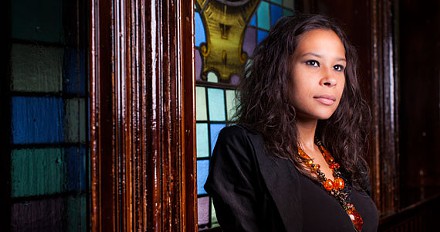

What makes spoken word poetry so important to you?
For me spoken word is tied up with community. It is tied up with my identity as a black woman living in Nova Scotia. I approach it from an African perspective living in Nova Scotia. We haven’t had the luxury to make art that isn’t material. That’s what this is: art for black people created by black people.
Where does the power of spoken word poetry come from for you?
The power of spoken word for me is that there’s very few black African Nova Scotians speaking to our truth, but at the same time the power of spoken word is that it’s a presence, its an embodiment of your power, your struggle.
Why spoken word and not written page poetry?
It’s the way you relate to the audience – you see the person in front of you, you see the emotion and you feel the emotion.
Where does your struggle come from?
I never said I wanted to be poet laureate, or write a book, it’s always been a step-by-step sort of journey and it’s a struggle. I’m a black woman and I do political poetry.
There was a time where I wasn’t invited anywhere in Canada for two years. I was never invited to Province House (Nova Scotia House of Assembly) or to be on the bill for Black History Month. I was always on the street slamming at people. There was a lot of hostility that I was doing this thing that shouldn’t be done. That struggle is in my work still and that is the power of spoken word.
Talk to me about the book you’ve written, Live from the Afrikan Resistance!
I think all artists are perfectionists. It is my first and maybe my only book. I have a lot of material and I really only love like five of my poems. But I have to represent me. If you ask me now, half the book would be different. It’s a snap shot a moment in my spoken word, not who I am in a totality.
I thought I should do some black, but some other stuff too, but then I realized it had to be a black book which makes it a militant book. My mom tried to sell it at church.
Your writing is very simple. Not in a bad way, but in a way that is accessible. Is that your aim overall?
I’m not trying to write good poetry. I’m trying to write for prisoners. It’s supposed to be accessible. It’s not avante-garde poetry. The morality of spoken word is important. It’s an urgent art form.
You focus a lot of your work on prison outreach and youth engagement. Can you explain how and why you choose that outlet in particular to share your work?
There’s a sense it chooses you. It’s intimately connected to who I am and what my politics, ethics and beliefs are. You know, I got invited into prisons because I was a poet. I have integrity as a poet so I want to speak to my community. How could I not go (to prisons)? So many of my people are incarcerated and I can’t talk about liberation and freedom when I know so many people who are not liberated.
One way that human beings connect is through writing. They are human beings, we are human beings. If you like writing, go to prison and find people to write with you — that’s where people who write letters and poetry are.
When was the first time you went to a prison to do spoken word?
Oh, I don’t know. 2008. Last couple of years I go all the time. Now I’m just visiting my friends, because that’s what this is. It’s a friendship.
What’s the best part of being Halifax’s poet laureate?
You get to connect to communities and people. People feel when I go to places like prisons that poet laureate is significant and it gives them significance and recognition. That title gives inspiration when I go to prisons.
